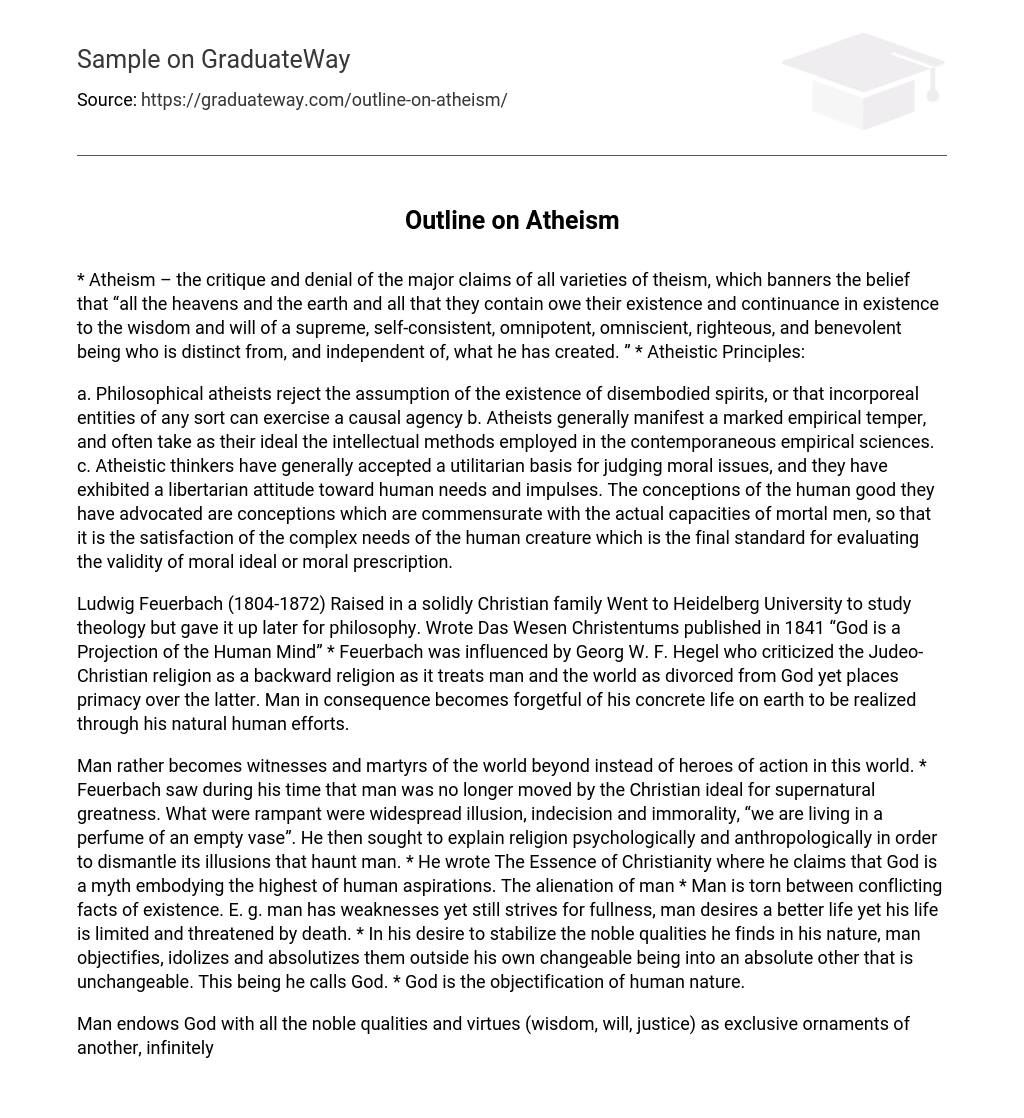Atheism is the criticism and rejection of the core beliefs of all forms of theism. It challenges the notion that a supreme being, who is separate from and has power over everything in the universe, is responsible for creating and sustaining all aspects of existence.
Atheistic Principles:
- Philosophical atheists reject the assumption of the existence of disembodied spirits, or that incorporeal entities of any sort can exercise a causal agency
- Atheists generally manifest a marked empirical temper, and often take as their ideal the intellectual methods employed in the contemporaneous empirical sciences.
- Atheistic thinkers have generally accepted a utilitarian basis for judging moral issues, and they have exhibited a libertarian attitude toward human needs and impulses.
The advocated conceptions of the human good are aligned with the actual capacities of mortal men. Thus, the ultimate criteria for evaluating the validity of moral ideals or prescriptions is based on satisfying the complex needs of human beings.
Ludwig Feuerbach (1804-1872) was brought up in a deeply religious family and enrolled at Heidelberg University to pursue theology. However, he eventually shifted his focus towards philosophy. In 1841, he released “Das Wesen Christentums,” wherein he contended that “God is a Projection of the Human Mind.” Feuerbach’s ideas were influenced by Georg W. F. Hegel, who criticized the Judeo-Christian faith for alienating humans from the world and prioritizing God instead. As a result, individuals become oblivious to their earthly existence and fail to acknowledge their own innate abilities.
Man is no longer motivated by the Christian notion of supernatural greatness; instead, they become witnesses and martyrs of the world beyond, rather than heroes of action in this world. Feuerbach, during his time, observed the prevalence of illusion, indecision, and immorality, describing the current state of affairs as “living in a perfume of an empty vase.” In an attempt to demystify religion and free man from its haunting delusions, he took a psychological and anthropological approach in his book The Essence of Christianity. Here, he argues that God is a myth that embodies the loftiest human aspirations.
Man experiences a sense of alienation as he navigates the contradictory aspects of his existence. Despite his weaknesses, he endeavors to achieve fulfillment and longs for an improved life. However, the reality of his mortality imposes limitations and threats. In order to safeguard the noble attributes he recognizes in himself, man tends to externalize, idolize, and elevate them to an absolute other that remains immutable. This external entity is commonly referred to as God.
Man perceives God as the embodiment of his own nature, attributing to him all the admirable traits and characteristics (such as wisdom, willpower, and fairness) that he perceives as exceptional attributes of a superior being. Simultaneously, man disowns these qualities as his own, leading to a devaluation and depletion of his own inherent essence. In essence, man sacrifices himself for the emergence of God.
Feuerbach viewed religion as a state of immaturity for humanity. In contrast, atheism represents an act of maturity, as it involves reclaiming faith in one’s own greatness and humanity. Essentially, God is just a manifestation of man’s essential qualities that have been attributed to Him. Humanism, then, is the recognition of man’s divine nature, acknowledging one’s own greatness and humanity. Feuerbach believed that what is considered atheism today will eventually become religion in the future. Furthermore, human consciousness is always aware of what it is not and what it can potentially become, thereby preventing a final, fixed, and complete identity to be attained.
Man determines his own existence and is fully accountable for the person he becomes. According to the philosophy of existentialism, man does not possess a predetermined essence but rather constructs it through his own actions. The core essence of man is defined by his freedom, as his consciousness continuously shapes his essence through choices.
Choice and action are integral. However, man is “condemned to be free” due to the fact that he did not opt for existence, yet possesses the liberty to make choices. As a pour soi, man achieves genuine freedom solely when involved in a world that opposes him, amidst his given situations (facticity). Nevertheless, the pour soi is not dictated or affected by these situations as their significances arise from his own consciousness, rendering them as “facticity for me”.
According to Sartre, if God exists, then essence would come before existence and consciousness would not be what it is. This is because God would have already determined its essence. However, Sartre argues that God’s existence contradicts the experience of consciousness, which is continuously creating itself. Being God means being both an en soi and a pour soi simultaneously, which Sartre deems impossible. Without God, there would be no moral values that guide human actions. Similarly, just as humans do not possess a fixed and predetermined nature, there are no objective values to govern their actions.





